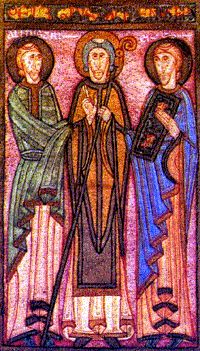
Pelagius (or Pelayo) of Oviedo (died 28 January 1153) was a medieval ecclesiastic, historian, and forger who served the Diocese of Oviedo as an auxiliary bishop from 1098 and as bishop from 1102 until his deposition in 1130 and again from 1142 to 1143. He was an active and independent-minded prelate, who zealously defended the privileges and prestige of his diocese. During his episcopal tenure he oversaw the most productive scriptorium in Spain, which produced the vast Corpus Pelagianum,[1] to which Pelagius contributed his own Chronicon regum Legionensium ("chronicle of the Kings of León"). His work as a historian is generally reliable, but for the forged, interpolated, and otherwise skilfully altered documents that emanated from his office he has been called el Fabulador ("the Fabulist")[2] and the "prince of falsifiers".[3] It has been suggested that a monument be built in his honour in Oviedo.[4]
- ^ A catalogue of the Corpus can be found in the Inventario General de Manuscritos de la Biblioteca Nacional, IV (Madrid: 1958), no. 1513, pp. 401–4.
- ^ According to Simon Barton and Richard A. Fletcher (2000), The World of El Cid: Chronicles of the Spanish Reconquest (Manchester: Manchester University Press), p. 65 and n3, this comes from M. G. Martínez (1964), "Regesta de Don Pelayo, obispo de Oviedo," Boletín del Instituto de Estudios Asturianos, 18:211–48.
- ^ According to Barton and Fletcher, p. 70, the sobriquet was coined by Peter A. Linehan (1982), "Religion, Nationalism and National Identity in Medieval Spain and Portugal," Religion and National Identity, ed. S. Mews, Studies in Church History, 18 (Oxford: Oxford University Press), 161–99, at p. 162. Linehan (1993) History and the Historians of Medieval Spain (Oxford), 78, also remarks that Pelagius "was a giant amongst falsifiers in an age which provided him with keen competition and ample opportunity."
- ^ Vicente J. González García, "El obispo don Pelayo, clave para el estudio de la historia de Asturias", El Basilisco, 8 (1979), 72–84.